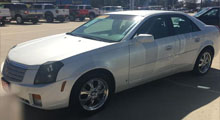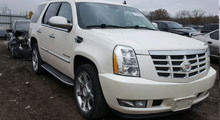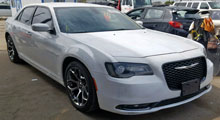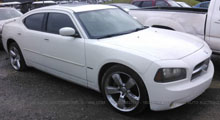Repo Vs. Branded Vehicles
Repossessed vehicles are often mistakenly grouped with branded title vehicles such as salvage or rebuilds. While both generally offer great savings, the similarities end there. Here’s what you need to know about both types of vehicles.
Repossessed Vehicles
A vehicle is repossessed when its owner has not kept up with the auto financing payments, this can take place pretty quickly or may take some time depending upon state laws and the company’s policy. Deals may be made to reduce payments or a catch-up plan, as finance companies make their money on the interest on the loan repayments. It is, therefore, in their interests to keep the money, and their interest, coming in.
Once the owner has defaulted on the loan, the finance company can repossess the vehicle. It then becomes their legal property and they will sell it to recoup some of their costs. Any outstanding amount and costs after the sale will be paid for by the person who took out the loan. The vehicle will be sold either directly by the finance company or it may go to auction or on to a dealer who specializes in repossessed vehicles. In the latter case there may even be a possibility of paying for a warranty on the vehicle, which signifies their confidence in its condition. Dealers will charge more, but they may also clean up and service the vehicles before putting them on their lot and prospective buyers will have longer to consider their purchase than at an auction.
Repossessed vehicles nearly always offer great savings off the list price. However, like any used car, they can also have problems. Their history and how they were repossessed is not always straightforward. If some were not voluntarily repossessed they can have suffered some damage at their ex-owner's hands in order to spite the financing company. However, most people are sensible enough to realize that the higher the price that their car is sold for, the less they will owe to clear the remaining balance of their loan.
In general, repossessed cars make great purchases, with not much more to worry about than your standard used car sale, provided you use common sense and stick to your limits. If a repossessed car deal seems too good to be true, like any used vehicle, there is probably a catch.
Branded Title Vehicles
A vehicle may have its title branded for several reasons, such as having been involved in an accident, damaged by floods, recovery after theft or being written off. In general, vehicles are branded when the cost to repair them would be greater than replacing them, in most cases repair would cost between 75%-100% of the vehicle’s value. In some cases, the vehicle may have no visible damage, in other cases it may be a complete wreck and only be suitable for spare parts.
Damaged vehicles are often branded ‘salvage’ and are not roadworthy. Even if the vehicle looks and drives fine, it cannot legally be driven on the highway. Buyers should be extremely cautious about purchasing a salvage title vehicle that seems ready to drive as it automatically raises questions about why the owners have not had it inspected and reclassified before selling.
Once a salvage branded vehicle has been repaired, if this is indeed possible, it needs to be inspected to be able to return to the road. If it passes these tests it is declared ‘rebuilt’ and a rebuilt title is issued for the vehicle by that state’s DMV. The exact title wording can vary from state to state, as do the exact rules and regulations concerning title branded vehicles. For example, in some states, only licensed rebuilders can purchase salvage vehicles to restore them.
In certain states, vehicles may class as rebuilds if they have had certain parts replaced even though they have never been titled salvage. This concerns parts such as the complete inner structure or frame. In short, the branding of titles serves to warn prospective buyers that the vehicle has undergone serious damage and that their safety may be at risk.
While not all branded cars are dangerous, the majority can still be a risk even after being rebuilt. It is possible to find branded vehicles that were not severely damaged and that offer an excellent chance to purchase a vehicle at a low price. However, due to there often being a lack of vehicle history and the complex nature of state laws concerning rebuilds, it is not easy to be certain. Title brands may be altered depending on the vehicle’s state, but the vehicle’s title will remain permanently branded adversely affecting value, financing options, insurance premiums and coverage.
The Differences
Branded vehicles differ significantly from repossessed vehicles. Repossessed vehicles are repossessed through no fault on the vehicle, but through their owner defaulting on their auto finance agreement. Branded vehicles are branded because they have suffered a major impact or some sort of damage which writes them off or makes repairing them more expensive than a replacement. Purchasing a branded vehicle involves a much greater element of risk, not merely financial but also physical. A repossessed vehicle may have some issues, as can indeed any used car, but not to the extent that it would be title branded.
The differences do not end there, anyone considering purchasing a branded vehicle would be advised to pay upfront as the majority of auto financing companies refuse credit for the purchase of branded title vehicles. This is yet another reason many people steer clear of branded title vehicles. Repossessed cars can be purchased on normal auto finance, like a traditional used car.
Another extremely important detail is the differences in insurance between repossessed and title branded vehicles. A repossessed car can be easily insured as any used car and costs will depend upon its mileage, the driver’s age, location, typical mileage, in short no different to any other vehicle. The new owner will be free to choose the level of coverage that they wish to pay for. Title branded vehicles are difficult to get insured and when insurance is available, it is very costly and only offers an extremely limited coverage. Any potential savings made by purchasing a branded vehicle could well go towards the inflated insurance costs and high deductibles in case of a claim.
Apart from offering substantial savings, repossessed vehicles and title branded vehicles have as much in common as your average used car and a branded vehicle. Vehicle branding has been put in place to warn potential purchasers of the danger that certain vehicles may put them in after having been damaged. It is extremely difficult to know when a branded vehicle could make a good purchase and it is generally best left to the experts. Although branded vehicles offer huge discounts, they could potentially pose more of a danger, especially from those damaged in severe accidents. In the vast majority of cases of repossessed vehicle sales, it is the financing company’s desire for a quick sale and recoup of their losses that lead to good discounts, not any fault on the vehicle itself, making them a much safer, more practical and economical choice.





